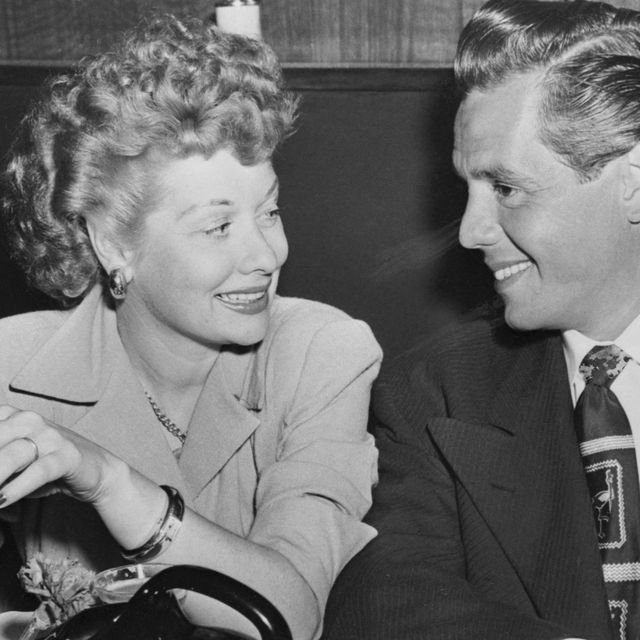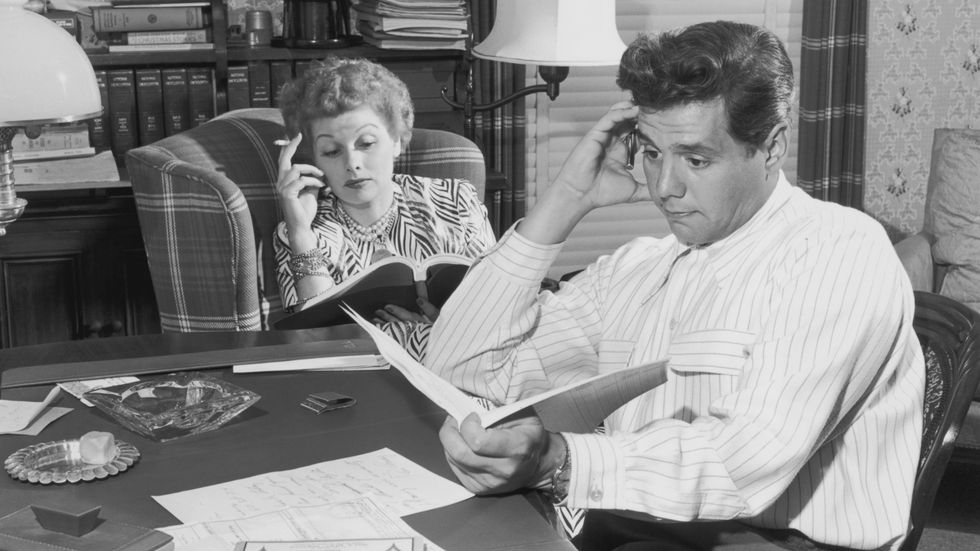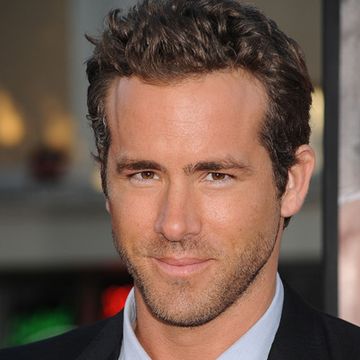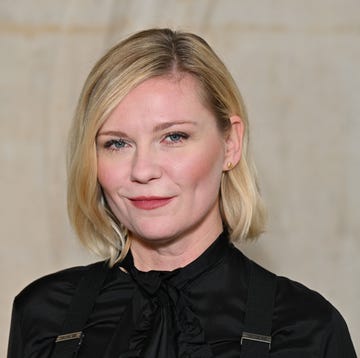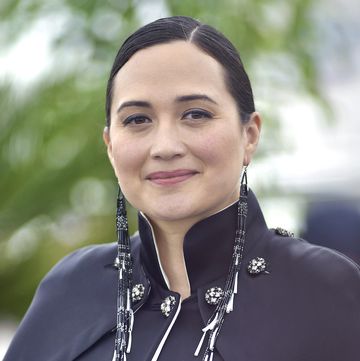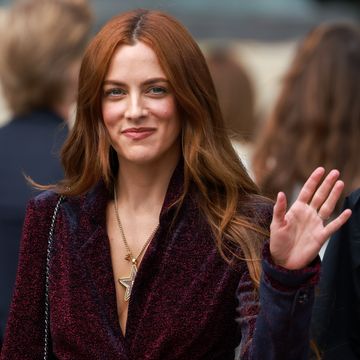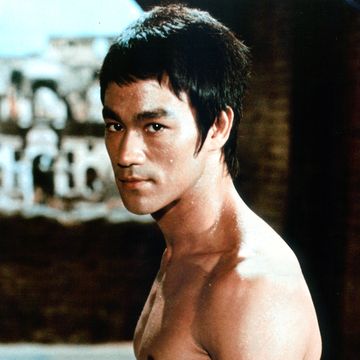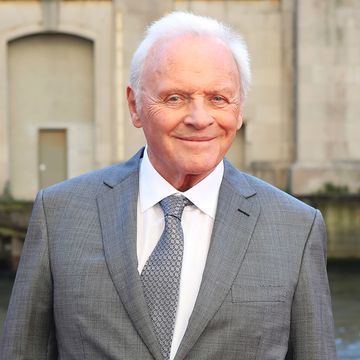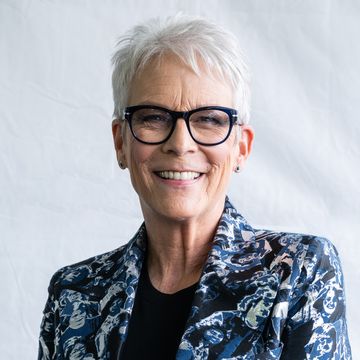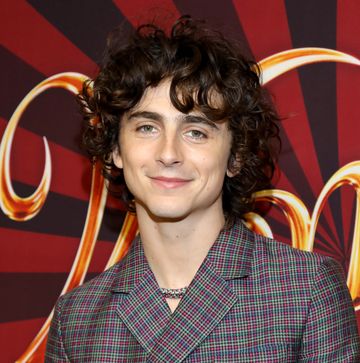By the late 1940s, Lucille Ball was at a crossroads in her professional and personal lives.
After 15 mostly successful years in Hollywood, she was beginning to lose ground to younger, fresher actresses who didn't command her hefty asking price for feature film roles. Furthermore, she longed to stabilize her oft-tempestuous relationship with her actor and musician husband Desi Arnaz, then spending much of his time on the road with his band.
A turn to radio in 1948 with CBS' My Favorite Husband, co-starring Richard Denning, gave her career a jolt by capitalizing on her comedic talents. And while her next move seemingly provided the solution to her personal yearnings, it also yielded the unintentional result of changing the course of TV history.
READ MORE: Inside Lucille Ball and Desi Arnaz's 'Fantastic Romance' and 'Successful Divorce'
Ball and Arnaz created a touring act to show they could work together
As told in Desilu: The Story of Lucille Ball and Desi Arnaz, CBS sought to build on the success of My Favorite Husband by adapting it for the small screen. Ball informed the network that she would be happy to do a televised version, provided her real-life husband was signed to play the part of the fictional one.
This was a no-go for CBS executives, who insisted that the viewing public would never accept the screen pairing of the "all-American" Ball with the Cuba-born, accented Arnaz.
Sticking to their guns, Ball and Arnaz elected to launch a touring vaudeville act to showcase their performing chemistry under the banner of a new production company, Arnaz taking the role of president and Ball signing on as vice president. They titled their venture "Desilu," an amalgamation of their names that had already been assigned to their five-acre ranch and other jointly owned possessions.
Their summer 1950 tour was a hit, leaving critics raving about the song-and-dance routines and especially Ball's physical comedy prowess. By early 1951, both CBS and sponsor Philip Morris were ready to latch on to a weekly half-hour comedy program costarring the dynamic husband-and-wife team.
Arnaz acquired full ownership of ‘I Love Lucy’ episodes
While enthusiasm for what became I Love Lucy was high, a few sizeable details remained that threatened to derail the entire endeavor.
For starters, Ball and Arnaz had no intention of leaving their comfy suburban-L.A. ranch to move to New York City, then the center of the TV production industry. When executives balked at the idea of the dominant East Coast audience watching the show by way of kinescope – a low-quality recording used to accommodate time-zone differences – Desilu suggested they record the series on high-quality film.
This presented another hurdle, as union contracts prevented CBS from filming the show at their facilities and threatened to double the price tag of production. But Arnaz was ready with a response that would satisfy his partners and revamp the industry model, as he was willing to lop $1,000 off the weekly salary he shared with his wife, in exchange for Desilu Productions obtaining full ownership of the final product.
‘I Love Lucy’ broke ground on and off the screen
I Love Lucy hit the ground running in the fall of 1951, with any worries about the pairing of a mixed-race couple quickly muted by the favorable response to the emotional back-and-forth between Lucy and Ricky Ricardo. With a helping hand from supporting characters Fred (William Frawley) and Ethel Mertz (Vivian Vance), I Love Lucy surged to the top spot in the ratings before the end of its first season.
The overwhelming success cleared the path for Desilu to take more chances with the hit show, particularly with a storyline built around Ball's real-life pregnancy in season two. On the same day the actress gave birth to Desi Jr. in January 1953, audiences watched a recorded Lucy introduce Little Ricky to the world.
There were groundbreaking moments off the screen as well. Although Arnaz was not the first to use a three-camera filming method, as has sometimes been reported, he did commission the purchase of a powerful Moviola editing device – nicknamed "Desilu's Four-Headed Monster" – to make the process of combining footage more efficient.
More notably, Arnaz capitalized on the foresight that gave Desilu full ownership of their work: As part of negotiations with CBS in 1954, he agreed to let the network air older episodes of I Love Lucy, a deal that brought in new sponsorship income and launched a lucrative syndication market for TV programs.
Arnaz rapidly expanded the company
While Ball was up to virtually any challenge that made use of her comedic abilities before an audience, cementing the show's stranglehold on the top spot in the ratings, Arnaz proved equally fearless when it came to expanding Desilu.
He immersed himself in the business, launching the successful TV adaptations of Our Miss Brooks and December Bride by 1954. Around that time, he completed the purchase of the Motion Picture Center facilities in Hollywood, renting out its extra soundstages to non-company productions.
I Love Lucy bowed out in May 1957, but Desilu Productions kept humming along through its president's wheeling and dealing. His coffers boosted by the sale of Lucy episodes to CBS for $4.3 million in 1956, Arnaz turned around and acquired RKO Studios in late 1957 for around $6 million. One year later, Desilu became a publicly traded company when all 525,000 shares were snapped up shortly after hitting the market.
Ball divorced Arnaz before taking over Desilu
Having assembled a TV production empire, Arnaz's expenditures also enabled him to achieve many of his creative dreams.
His long-favored preference for airing Lucy programming as hour-long, monthly specials materialized with the Lucille Ball–Desi Arnaz Show in fall 1957. The following year, he launched the ambitious Westinghouse Desilu Playhouse, an anthology series that spawned popular series like The Untouchables and The Twilight Zone.
However, the impressive accomplishments weren't enough to sustain their marriage. Fed up with Arnaz's heavy drinking, Ball filed for divorce in March 1960 after shooting the final episode of The Lucy–Desi Comedy Hour.
The two still managed to maintain an amiable work relationship: Desilu signed on to produce Wildcat, a Ball-headlined stage show that ran on Broadway from late 1960 into spring 1961, and Arnaz helped launch his ex-wife's next TV effort, The Lucy Show, in October 1962.
But the professional interactions abruptly ended with the November announcement that Ball had bought out Arnaz's 300,000-plus stock shares, reportedly due to her fears that his alcoholism was impairing his dealings and hurting the company image. The move marked another industry first for Desilu, as Ball was now the first female head of a major Hollywood studio.
Ball struggled to run the studio on her own
After more than a decade of ceding business decisions to Arnaz, Ball attempted to run the operation with a few trusted deputies while meeting the demands of carrying a highly ranked TV show.
It was an uphill battle from the get-go, as she sorely missed her ex-husband's affinity for numbers, people skills and storytelling capabilities. While Desilu continued to do solid business by way of renting its facilities, the company struggled to land a winner with its slate of developing shows.
Ball did score a few major victories during her time at the helm. She notably ignored exorbitant production costs and helped push two promising series into existence, for which Star Trek and Mission: Impossible fans can thank her today. Still, few insiders were surprised when the actress and reluctant boss agreed to a buyout from Gulf + Western Industries, owner of Paramount Studios, in early 1967.
Ball continued doing what she did best, closing The Lucy Show with back-to-back Emmy wins before moving on to Here's Lucy for another six seasons. But her departure also ensured that Desilu would be swallowed up in the unforgiving Hollywood landscape, relegating to virtual obscurity the pioneering company that once stood at the forefront of the industry and represented the finest efforts of its famous founders.
